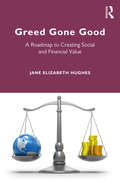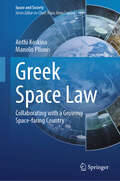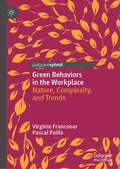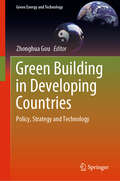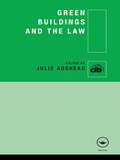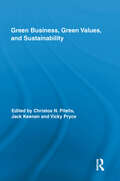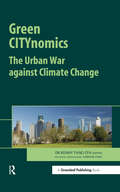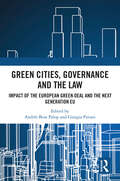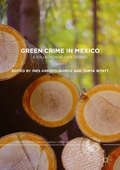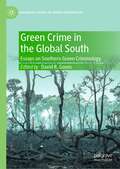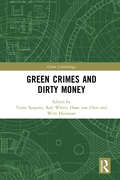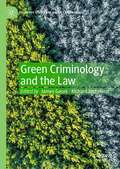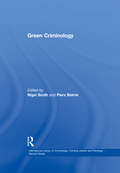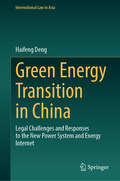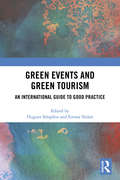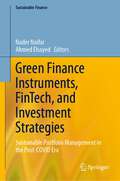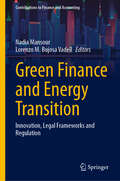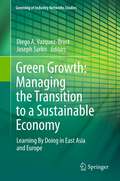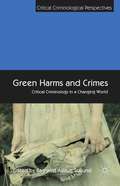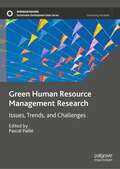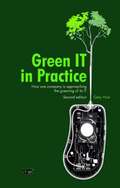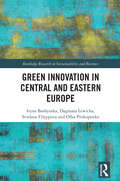- Table View
- List View
Greed Gone Good: A Roadmap to Creating Social and Financial Value
by Jane Elizabeth HughesGreed Gone Good: A Roadmap to Creating Social and Financial Value brings the how-tos of impact finance to a broad- based audience of investors, from the individual to the institutional. Written in an engaging, jargon-free style and loaded with practical advice, it explores the pitfalls and potential of the burgeoning impact revolution—the increasingly widespread belief that business and financial leaders should weigh social value as well as financial value in all of their decisions, to create both a better business model and a better world. Cheerleaders have written a number of books advocating the magic of impact finance. Greed Gone Good hopes for the magic too, but also believes that an uncritical eye does not effectively advance the cause. We now have 10 years of impact investing history to examine, and not all of it is laudable. We could hold hands and sing Kumbaya in praise of impact finance; or we could employ constructive criticism to figure out what’s gone well and what hasn’t, and how we should move forward more productively. Greed Gone Good focuses on the roadmap—how to reorient and repackage finance and investing in order to deliver on this promise. In particular, it focuses on how to realize the potential of the impact revolution to become a silver bullet against future failures. Green Gone Good will have widespread appeal to investors ranging from individuals and family offices to the world’s largest asset managers and investors.
Greed on Trial: Doctors and Patients Unite to Fight Big Insurance
by Theresa BartaA trial attorney recounts her fight against insurance companies who put profit before patients—and wrongfully terminate doctors who don&’t comply.In the modern world of American medicine, insurance companies call the shots. Their policies often require cutting corners on patient care in pursuit of profit. These policies often reduce the amount of time doctors spend with patients, push older and cheaper medications, and limit the number of tests and referrals doctors can order. And if doctors don&’t comply, they could lose their insurance affiliations.Despite the risks, some brave doctors choose to resist these policies—only to find themselves out of a job. That&’s where attorney Theresa Barta steps in. Barta specializes in suing insurers and health-care companies who wrongfully terminate doctors. In Greed on Trial, Barta&’s takes readers inside three dramatic and important cases from her files. In each story, we watch Theresa assemble her evidence and fight the scourge of insurance company abuse in the court of law.
Greek Popular Morality in the Time of Plato and Aristotle
by K. J. DoverA book useful in understanding events of the time, such as the death of Socrates.
Greek Space Law: Collaborating with a Growing Space-faring Country (Space and Society)
by Manolis Plionis Anthi KoskinaThis book provides an overview of the Greek legislation applying to space activity under the responsibility of the Greek State, as in line with international space law. Greece is not an established space-faring country; however, it is showing particular dynamism, making the most of its participation in international and EU space endeavors. Indeed, along with outstanding achievements in space science Greece took legislative action both at the international and national levels (proposals at the UNCOPUOS; Greek space law; signing of the Artemis Accords). Hence, the time has come to refer to – and present aspects of – the Greek space legislation. After an introductory section, the book provides information first on the national laws providing for the Greek participation in international space systems and in EU activities, which could be regarded as being the initial steps of Greece in the context of space. Thereafter, the rules applying to Greek space activity per se are presented, focusing on the authorities competent to decide on space matters, then on the substantial law rules allowing for – and clarifying – the application of international space law to domestic space operations. This book presents an overall view and analysis of the Greek space legislation, adding valuable information to the existing bibliography. Included as an appendix is a scholarly translation of the 2017 Greek space law.
Green Behaviors in the Workplace: Nature, Complexity, and Trends
by Pascal Paillé Virginie FrancoeurThis book examines the spectrum of green behaviors in organizational settings, focusing on the contribution that employees make through their environmental engagement. The authors provide an overview of green behaviors while clarifying the meaning of the concept and its critical importance to greening employees. By distinguishing between voluntary (e.g., encouraging colleagues to express their ideas about environmental issues), prescribed (e.g., having an obligation to implement environmental policies), and counterproductive (e.g., not caring about water or electricity consumption) behaviors, the book rethinks sustainable development, placing the psychological and environmental dimensions on a par.Aimed at researchers in human resource management, organizational behavior, organizational change, and psychology, this interdisciplinary study proposes a novel approach to sustainability by assessing employee behaviors at work.
Green Building in Developing Countries: Policy, Strategy and Technology (Green Energy and Technology)
by Zhonghua GouThe book reveals how green buildings are currently being adapted and applied in developing countries. It includes the major developing countries such as China, Indonesia, Malaysia, Thailand, Pakistan, Cambodia, Ghana, Nigeria and countries from the Middle East and gathers the insights of respected green building researchers from these areas to map out the developing world’s green building revolution. The book highlights these countries’ contribution to tackling climate change, emphasising the green building benefits and the research behind them.The contributing authors explore how the green building revolution has spread to developing countries and how national governments have initiated their own green building policies and agendas. They also explore how the market has echoed the green building policy, and how a business case for green buildings has been established. In turn, they show how an international set of green building standards, in the form of various techniques and tools, has been incorporated into local building and construction practices. In closing, they demonstrate how the developing world is emerging as a key player for addressing the energy and environmental problems currently facing the world.The book helps developers, designers and policy-makers in governments and green building stakeholders to make better decisions on the basis of global and local conditions. It is also of interest to engineers, designers, facility managers and researchers, as it provides a holistic picture of how the industry is responding to the worldwide call for greener and more sustainable buildings.
Green Buildings and the Law
by Julie AdsheadIn countries such as the UK, the energy used in constructing, occupying and operating buildings represents approximately fifty percent of greenhouse gas emissions. Pressure to improve the environmental performance of buildings during both construction and occupancy, particularly to reduce carbon emissions from buildings, has become intense. Understandably, legislation and regulation are driving green development and compliance. And this is happening in a wide variety of ways. This review of the law in key jurisdictions for the research community, lawyers, the construction industry and government examines some of the mechanisms in place – from the more traditional building regulation controls to green leases and the law relating to buildings and their natural environment. Members of the CIB TG69 research group on ‘Green Buildings and the Law’ review aspects of the law relating to green development in a range of jurisdictions.
Green Business, Green Values, and Sustainability (Routledge Studies in Corporate Governance)
by Vicky Pryce Christos N. Pitelis Jack KeenanToday greenness is goodness; non-greenness is not an option. It is therefore critical to advance thinking on why and how business, consumers and policy makers can contribute to the goal of sustainable global wealth creation. This volume analyzes the strategic sustainability issues confronting contemporary business, and explores the transformation in values, strategies, and practices needed by modern businesses to attain sustainable business. It is is developed from a Global Business Symposium organized by the Centre for International Business and Management (CIBAM) at Cambridge University in February 2009, which brought together leading academics, scientists and engineers, government leaders, and business executives to consider the transformation in business values and strategies implicit in sustainability. Green Business, Green Values and Sustainability offers a concise and definitive book on the green transformation of business in major sectors including government, finance, energy, and retail. Different solutions to sustainability are explored including ethical approaches, alternative environmental strategies, corporate responsibility, and carbon reductions.
Green CITYnomics: The Urban War against Climate Change
by Kenny Tang Lorraine TangToday, more than half of the world's population are living in cities that are now contributing 80% of global greenhouse gas emissions. They cover less than 3% of the earth's surface. And urbanization continues apace. With such a massive carbon footprint, it is vital that cities are part of the solution. Despite this, scarcely any consideration has been given to the potential impact of climate change on urban dwellers, especially in the developing countries and burgeoning megacities of Africa, Asia and Latin America, where a wide variety of environmental and development challenges are likely to further exacerbate their vulnerability to climatic effects. Green CITYnomics presents a rich set of contributions by a highly diverse group of 45 of the world's leading urban experts on climate change. In particular, it illustrates the desire some cities are already demonstrating in engaging in this war. Standing still is not an option. Budgets have to be fought for; minds have to be won over; old, untenable and unsustainable ideas and solutions must be challenged; green and sustainable solutions must be given the chance to develop and to prove themselves. Each of the cities and urban centres discussed – from Hong Kong to Dresden; from Mexico City to Qatar – are, in their own ways, heroes and examples to us all. This book provides a compelling manifesto for the world's cities in their "Urban War against Climate Change". It is essential reading for climate scientists, national and local policy-makers and scholars worldwide.
Green Cities, Governance and the Law: Impact of the European Green Deal and the Next Generation EU
by Andrés Boix Palop and Giorgia PavaniThis book focusses on the developing role that the city currently plays in dealing with the effects of climate change and the instruments that can be utilised to make them truly green. Cities are at the centre of European directives aimed at tackling climate change, representing a key part of the European Green Deal and the National Recovery and Resilience Plans. As such, they provide valuable case studies for other countries grappling with how to address sustainability issues. This book is divided into three parts, with the first analysing Green urban planning and local governments in the European framework. The second examines various thematic aspects relating to this intersection, looking at the National Recovery and Resilience Plans, the right of the city and environmental issues. The third and final part presents case studies from four European cities showing how they are facing this transformation. These include Bologna, Paris, Barcelona and Valencia, each chosen by the Mission climate-neutral and smart cities by 2030. Bringing together leading experts, some of whom have been directly involved in developments, the book presents invaluable comparisons that will be of interest to a wider international readership. The book will be of interest to academics, researchers and policymakers working in the areas of Public Law, Environmental Law, Urban Law and Governance.
Green Crime in Mexico: A Collection Of Case Studies (Palgrave Studies In Green Criminology Ser.)
by Tanya Wyatt Ines Arroyo-QuirozThis collection is the first exploration into green crime in Mexico, offering a unique critique of the environmental problems facing Mexico today. Written by a diverse range of Mexican academics and practitioners from different career stages and various different disciplines, this edited volume exposes the corruption, power, and disregard for the environment through highly detailed and engaging case studies. The chapters are grouped into four categories: Environmental Degradation, Social and Environmental Justice, Wildlife Trafficking, and Non-compliance with Environmental Obligations, and are illuminated by rigorous original research. This book fills a substantial gap in knowledge about concerns that are important not only to the Mexican people and the wider region, but to anyone with an interest in the environmental issues facing the world today. To this end, the contributors hope to inspire other Mexicans to study and research green crimes as well as to influence scholars and practitioners across Central and South America who are facing similar environmental crises and challenges.
Green Crime in the Global South: Essays on Southern Green Criminology (Palgrave Studies in Green Criminology)
by David R. GoyesThis book presents a socio-criminological study of environmental crime in the global South. It gathers contributors from all the regions of the geographical global South (Africa, Asia, Oceania, and Latin America) to discuss instances of environmental crime and conflict. Overall, it seeks to further decolonise the knowledge production of green criminology. It considers the legacy of colonisation, North-South and the core-periphery divides in the production of environmental crime, the epistemological contributions of the marginalised, impoverished, and oppressed, and the unique contexts of the global South. This book has three sections: drivers of green crime in the global South; responses to environmental harm in the global South; and global dialogues about crime and destruction in the global South. The first two sections represent the breadth of the topics that green criminologists have historically studied but from unique perspectives. The third section explores ethical and decolonial ways for Southern green criminology to collaborate with Western academia. This book speaks to scholars in criminology, political ecology, decolonial theory, along with the many readers interested in the interactions between humans and nature.
Green Crimes and Dirty Money (Green Criminology)
by Toine Spapens, Rob White, Daan van Uhm and Wim HuismanEnvironmental crimes are primarily driven by financial motives. The combined financial value of illicit trade in protected wildlife, illegal logging and waste trafficking is estimated to come directly after counterfeiting, the narcotic drugs trade and illegal gambling. Logically, the proceeds of these crimes must also be laundered. Goods, however, are not the only money maker for environmental criminals. Corporations may also try to ‘save’ costs by not complying with environmental regulations and thus commit crimes of omission rather than commission. From an enforcement and compliance perspective focusing on the proceeds of crime may therefore be an effective strategy. This book brings together different perspectives on the financial aspects of environmental crime and harm from a green criminological viewpoint. It addresses the role of economic systems, the value of environmental performance for corporations, money laundering in the context of environmental crime, financial investigation and questions of regulation and penalties. Discussing these topics from the view of green criminology, sociology and governance, this book will be of great interest to all those concerned about the financial dimensions of crime and the environment.
Green Criminology and the Law (Palgrave Studies in Green Criminology)
by Richard Jochelson James GacekThis edited collection is grounded in a green criminological approach to understand whether the law, both in effect and implications, reflects, refracts, or sublimates the social, political and ecological conditions of our times. Since its initial proposal in the 1990s, green criminology has focused the criminological gaze on a wide array of harms and crimes affecting humans, animals other than humans, ecological systems, and the planet as a whole. As a continuously blossoming field of criminological inquiry, green criminology recognizes and examines behaviours that are both illegal and legal (yet detrimental), and in varying ways has made great efforts to provide insight into harms in a more fulsome manner. At the same time, there have been many significant legal instances, domestic, and international, including case law, legislation, regulation, treaties, agreements and executive directives which have troubled the law’s understanding of green harms, illegal and legal activity, pushing legal boundaries in the process. Recognizing that humanity and nature are inextricably integrated, Green Criminology and the Law reflects the range and depth of high-quality research and scholarship, combining contributions from established scholars willing to explore new topics and recent entrants who are breaking new scholarly ground.
Green Criminology: Constructions Of Environmental Harm, Consumerism, And Resistance To Ecocide (International Library Of Criminology, Criminal Justice And Penology - Second Ser.)
by Nigel SouthIn little more than a decade, Green Criminology has become an established new perspective in the field. It embraces an exciting and wide range of topics, from controversies about genetic modification through corporate offending against the environment and human communities, to animal abuse. Green Criminology provides a focal point for longstanding and new areas of research as well as making important interdisciplinary connections.
Green Energy Transition in China: Legal Challenges and Responses to the New Power System and Energy Internet (International Law in Asia)
by Haifeng DengThis book contributes to the scholarly and policy debate about China’s ongoing and increasingly ambitious strategies and actions in its pursuit of the green energy transition. Transitioning to a greener and more sustainable economy has become a shared policy priority worldwide in response to existential challenges posed by climate change and environmental degradation. After decades of unprecedented industrialization and economic growth at the expense of the environment, this green energy transition now tops China’s development agenda. Indeed, China already has years of experience advancing climate policies and institutional and regulatory mechanisms at home and is already a major player in advocating cooperation on climate actions internationally. At the same time, the development of new electrical power systems and the energy internet in China has been shaped not only by China’s overarching economic development goals and plans but also by its international engagements and commitments, with the involvement of a diverse range of stakeholders and driving forces. This book focuses on exploring the Legal challenges encountered in the development of China's new power system and energy internet, and takes the power grid enterprises that are at the core of the energy Internet value chain as the hub to deeply explore the role of key players in China's green energy transformation in the evolution of China's climate policies and actions.
Green Events and Green Tourism: An International Guide to Good Practice
by Emma Nolan Hugues SeraphinAs the appetite for leisure travel and events continues to grow at an exponential rate, the impact on the environment and local communities is becoming an increasing concern, not least by the users of the services. Green approaches to tourism and events are growing in popularity and present an opportunity to both identify solutions to significant environmental and societal problems and new approaches to business. <P><P>Green Events and Green Tourism looks at key frameworks, guidelines, principles and benchmarks that support the application of sustainability in practice. The five sections of the book cover themes of governance, accreditation, certification, innovation, priorities, trends, ambitions and consumer behaviour, and the chapters include examples of best practice in the organisation of music and arts festivals, special interest tourism, the green management of outdoor sites and the management of sports events. Readers will benefit from insightful case studies from around the globe.
Green Finance Instruments, FinTech, and Investment Strategies: Sustainable Portfolio Management in the Post-COVID Era (Sustainable Finance)
by Ahmed Elsayed Nader NaifarIn the COVID 19 post-pandemic era, sustainable financial systems are increasingly getting the attention they deserve, and policymakers are now moving toward investment and financing decisions based on sustainable development. Green finance plays an important role in mobilizing financial resources and hedging against environmental risk to achieve financially sustainable systems. Moreover, green financial instruments offer viable alternatives for investors and regulators with regard to portfolio management and risk minimization. Over the last few years, financial technology (FinTech) has grown to become one of the most topical areas in the global financial services industry. The development of distributed ledger technology, big data, smart contracts, peer-to-peer lending platforms, biometrics, and new digital has sparked innovation in the financial services industry and the development of new financing and investment strategies. The combination of sustainability and FinTech can help policymakers to achieve ESG targets when making investment and financing decisions. This book showcases a collection of recent advances in green finance and FinTech and explores their impact in achieving sustainable finance, investment strategy-making, and portfolio management. Presenting theoretical frameworks and the latest empirical studies in the field of green finance and FinTech, it offers a valuable asset for academics, professionals, policymakers, regulators, and investors who want to understand in-depth the impact of green finance and FinTech on future investment and financing strategies in the post-pandemic era.
Green Finance and Energy Transition: Innovation, Legal Frameworks and Regulation (Contributions to Finance and Accounting)
by Nadia Mansour Lorenzo M. Bujosa VadellEconomic models must evolve to avoid irreversible consequences for our planet in the face of climate change. The question is: How can we provide a growing population with access to affordable, viable energy while preserving our environment? Green finance is a pivotal concept that guides financial actions and operations toward fostering the energy transition and combating global warming. Finance, a key player in resource allocation, now incorporates an environmental dimension alongside the pursuit of economic profitability, setting it apart from 'traditional' finance. This book presents methods to provide a framework for financial transactions, support sustainable development, combat global warming, and enhance the transparency of financial product providers.
Green Governance
by David Bollier Burns H. WestonThe vast majority of the world's scientists agree: we have reached a point in history where we are in grave danger of destroying Earth's life-sustaining capacity. But our attempts to protect natural ecosystems are increasingly ineffective because our very conception of the problem is limited; we treat "the environment" as its own separate realm, taking for granted prevailing but outmoded conceptions of economics, national sovereignty, and international law. Green Governance is a direct response to the mounting calls for a paradigm shift in the way humans relate to the natural environment. It opens the door to a new set of solutions by proposing a compelling new synthesis of environmental protection based on broader notions of economics and human rights and on commons-based governance. Going beyond speculative abstractions, the book proposes a new architecture of environmental law and public policy that is as practical as it is theoretically sound.
Green Growth: Learning By Doing in East Asia and Europe
by Joseph Sarkis Diego A. Vazquez-BrustThis volume is a practical guide that helps the reader build a quick, evidence-based understanding of green-growth strategies and challenges. Its cogent analysis of real-life case studies enables policy makers and company executives identify successful strategies they can adopt, and pitfalls they can avoid, in drafting and implementing green growth policies. The contributors' empirical assessment of these studies identifies the structural conditions required for economic growth to be compatible with environmental sustainability and how the transition to a new economic paradigm should be managed. A crucial addition to the debate now beginning in earnest around the world, this volume attempts to understand how we can nurture a new-born model of sustainable growth and help it evolve to maturity.
Green Harms and Crimes
by Ragnhild Aslaug SollundThe book presents discussions of the application of Stan Cohen's theories alongside empirical contributions in the fields of critical and green criminology. Taken together, the authors critically address harms and crimes against the environment, as well as against human and nonhuman victims.
Green Human Resource Management Research: Issues, Trends, and Challenges (Sustainable Development Goals Series)
by Pascal PailléIn contemporary times, most organizational functions (such as finance, marketing, and supply chains) have assessed their impact on the environment. HR has lagged behind other disciplines in discussions of sustainability, though the literature on this topic has grown significantly in recent years. This book, engaging SDGs 4 and 8, among others, examines green HRM from a variety of perspectives. Divided into three sections, it explores the process of human resource acquisition, the connection between green HRM practice and employee behavior, and international perspectives of green HRM. The final chapter presents a summary analysis of topics discussed in the book and outlines potential future paths of research for the field. This volume, featuring leading researchers from across the globe, further develops this emerging field for HR and organizational behavior scholars.
Green IT in Practice
by Gary HirdOrganisations are becoming increasingly concerned about climate change, and are looking for ways to reduce their environmental impact. A brand with a genuine commitment to the green agenda will be more valued by its customers, and cutting energy consumption means that your business can also cut costs. The IT department has a vital role to play in minimising the carbon footprint of your organisation. Green IT in Practice, Second edition provides guidance on how to implement a Green IT programme. It will help you to formulate a Green IT policy, curb demand for data storage capacity, and lower the electricity consumption of the datacentre. A specific chapter looks at how server and desktop virtualisation can enable your business to save energy and space. Based on his first-hand experience of successfully implementing Green IT initiatives for the John Lewis Partnership, the author describes the specific problems that JLP confronted, and explains the solutions that he found for them. He gives a fascinating account of how Green IT has enabled one of Britain's best-loved companies to make significant improvements in efficiency. This second edition has been updated to reflect the progress that JLP's Green IT programme has made since 2008. The author shows how IT can be harnessed to help reduce carbon emissions across the whole organisation, pointing to the success of IT initiatives at Waitrose in improving demand forecasting and reducing food miles.
Green Innovation in Central and Eastern Europe (Routledge Research in Sustainability and Business)
by Dagmara Lewicka Iryna Bashynska Svitlana Filyppova Olha ProkopenkoGreen Innovation in Central and Eastern Europe aims to explore the crucial role of green innovation in guiding organisations towards sustainable development amidst contemporary environmental challenges.It comprehensively examines the concept of the green economy, highlighting its essential features and its significance in promoting organisational sustainability. The study delves into the global state of green economy development, analysing trends in renewable energy, circular economy practices, and green technology innovations. Additionally, it investigates the role of international organisations in supporting the green economy and its impact on global trade and business opportunities. The monograph also addresses strategic planning processes that enable enterprises to integrate sustainability goals into their business strategies, with a focus on social and environmental aspects. It evaluates recycling as a central component of the circular economy, considering its economic and environmental impacts, and underscores the importance of green leadership in fostering a sustainable organisational culture through ethical decision-making and environmental considerations.The book will cater to a diverse audience, including professionals, researchers, policymakers, and business leaders committed to steering organisations towards sustainable development. It serves business executives and managers looking to integrate eco-conscious strategies within their organisations, researchers and academics in environmental science and business management, policymakers involved in crafting environmental policies, and environmental advocates seeking practical approaches to advance green initiatives. The content is particularly pertinent to professionals in the European Union and Central and Eastern European countries, with specific insights and case studies from Poland, Estonia, and Ukraine.
